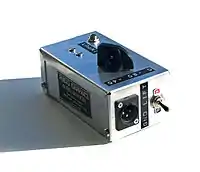Wolfbox
The Wolfbox is the name for the original passive DI unit, direct box, or DI as invented in the late 1950s by Dr. Edward Wolfrum, PhD, alumnus engineer of Motown, Golden World Records, Terra-Shirma Studios, Metro-Audio Capstan Roller Remote recording, and United Sound Systems in Detroit, Michigan.[1][2] Used by James Jamerson, Dennis Coffey, Bob Babbit and other The Funk Brothers, the Wolfbox was a key component in the 1960s and 1970s sound of recorded music in the Motown/Detroit scene.
Origin

According to Ed, the idea for the creation of the device originally came to him out of necessity, from "…Recording bands back then [early 1960s] and the fact that I simply couldn't afford microphones."[3] It was at Detroit's WEXL in 1962 that 16-year-old staff engineer Wolfrum incorporated his newly created passive direct interface box – later known at the "Wolfbox" – as an interface from the high-impedance output of church PA systems to the microphone input of broadcast audio mixers.
Recent versions
In 2013, a limited-edition run of 25 new Wolfboxes were designed, plotted, supervised & signed by Dr. Wolfrum,[4] in a non-exclusive (unlicensed) agreement with Acme Audio Mfg. Company. Using NOS components and original A-11J and A-12J triad transformers sourced from vintage gear, these new versions found their way to such places as Nashville's Blackbird Studios, London's Abbey Road, and to Blue Note Records President & bassist Don Was.[5] After the 25-unit production, Dr. Wolfrum ended his Acme collaboration[6] & released his schematic of the Wolfbox in 2014 for free public non-commercial use.[7][8] To date Acme Audio Mfg. Co. produces The Motown DI which uses original OEM Triad transformers.
Molybdenum and limited resources
The original Wolfboxes relied on vintage A-11J and A-12J Triad transformers (manufactured up to 1974) whose metal structure (i.e. Molybdenum composition) became regulated due to mining and manufacturing toxicity[9] by OSHA[10] and EPA restrictions.[11][12][13]
References
- Soul-Source: Ed Wolfrum - Detroit Sound by Moss, Rob in Soul News Past, 17 Apr 2012
- Ed Wolfrum interview on United Sound Systems, TQM Recording Co.
- Detroit Free Press, Brian Kaufman and Brian McCollum. Wolfbox
- Statement by Dr. Edward Wolfrum on Wolfbox
- Bass Player, July 19, 2014. Chris Jisi. Don Was Channels Sir Paul McCartney
- Statement by Dr. Edward Wolfrum on Wolfbox
- Wolfbox Schematic
- Wolfbox Background
- What You Should Know About Molybdenum PDF, Texas Dept. of State Health Services
- Molybdenum (soluble compounds, as Mo)
- Molybdenum (CASRN 7439-98-7)
- Molybdenum Regulatory
- NIOSH Chemical Hazards
External links
- Statement by Dr. Edward Wolfrum on Wolfbox - Audio Graphic Services
- Ed Wolfrum interview on United Sound - TQM Recording Co.
- Wolfbox Schematic - PDF, Audio Graphic Services
- Video interview with Dr. Edward Wolfrum - Detroit Free Press video interview, Brian Kaufman and Brian McCollum
- Soul-Source Article - "Ed Wolfrum - Detroit Sound" 2012 excerpt by Rob Moss from forthcoming book
- WDET Interview - "Motown Legends Dr. Ed Wolfrum and Paul Riser" The Craig Fahle Show, WDET-FM
- Molybdenum Toxicity PDF - "What You Should Know About Molybdenum" PDF, Texas Dept. of State Health Services